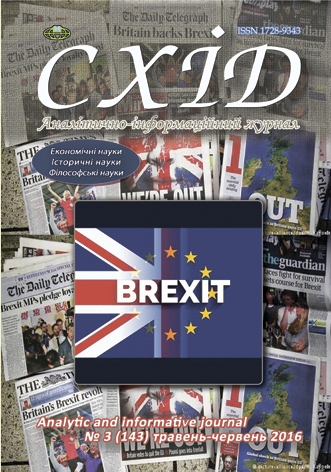Epistemology of the Orthodox theology of postmodern era
DOI:
https://doi.org/10.21847/1728-9343.2016.3(143).74843Keywords:
Orthodoxy, theology, phenomenology communication, existenceAbstract
The article is an analysis in key of religious studies of epistemology of Orthodox theology postmodern era. Analysis of epistemological doctrines of representatives of the Orthodox theology of the XXI century is especially relevant today because it is theological epistemology defines the nature of anthropology, ontology and systematic theology. Orthodox thinkers of the postmodern era are trying to create the phenomenology of communication with God as a personal reality. This greatly depends on the phenomenology of modern philosophy and theology, especially - from the theological works of French philosopher Jean-Luc Marion. Epistemology of the Orthodox theology of postmodern era is emerging, experiencing the transformation of complex mystical empiricism to hermeneutics of mystical experiences. Orthodox theologian A.Papanikolaou believes that truth is an event in communication. Man has true knowledge in the act of communion with God only insofar as it is involved in the inner life of God. A.Papanikolaou believes that knowledge of God in the act of communication exists only Trinity, which also involved person or Eucharistic community. If the act of communication according J.Zizioulas provides mutual ecstasy, going beyond its own existence to God and man, then according A.Papanikolaou God and man is always in communication, and the knowledge of God it is only when this communication becomes closer and more conscious. And man is in communion with God even outside the Eucharistic experience as always is in God as limited in infinite. J.P.Manoussakis stresses that the structure of the individual sensory overrides rational, passive-affective experiences influence more important than rational and volitional acts. Sensual experience with the most individual evidence. J.P.Manoussakis boldly puts forward the thesis: God exists if there is a sensual experience feelings meet with him. Originality views D.Hart that according to him the most unlimited line between God and man is infinitely call of God to man. Awareness abyss between God and man, revealing to man groundlessness its existence, is the beginning of knowledge human dignity.Downloads
References
Bublyk, K. (2016), The concept «Personality» in book «The beauty of the infinite» of David Hart, Skhid, 1 (141), 58-62 (ukr). doi: 10.21847/1728-9343.2016.1(141).64304
Ziziulas, J. (2005), Of Genesis as communion [transl.], Dukh i Litera, Kyiv, 276 p. (ukr).
Manoussakis, J. P. (2014), God after metaphysics. Theological aesthetics [transl.], Dukh i Litera, Kyiv, 416 p. (ukr).
Morozova, D. (2011), The idea of God between notes and words, Visnyk Kharkivskogo nacionalnogo universytetu im. V. N. Karazina, 950. Series: Theory of Culture and Philosophy of Science. Special Issue 2: koinonia. Another philosophy and theology of communication, 279-311 (rus).
Hart, D. B. (2010), The Beauty of the Infinite: The Aesthetics of Christian Truth [transl.], BBI,Moscow, 673 p. (rus).
Khrystokin, G. (2010), Postmodern neo-patristic existentialism John Zizioulas, Scientific Journal of the National Pedagogical University named after MP Dragomanova. Series 7: [Coll. scientific papers], Vol. 25 (38), NEA Dragomanov Press, Kyiv, 16-21 (ukr).
Khrystokin, G. (2011), Postmodern neo-patristic mystical empiricism John Manoussakis, Sententiae: [Coll. scientific papers], Volume XXIV. No. 1, Publishing National Academy of Sciences ofUkraine, Kyiv, 101-109 (ukr).
Chernomorets, Yu.P (2011), Orthodox theology by David Bentley Hart - the new beginning in the postmodern era, Theology portal, available at: http://theology.in.ua/ua/bp/theologia/contemporary/44359/ (rus).
Chernomorets, Yu.P (2013), Orthodox theology towards a new paradigm, Filosofska dumka - Sententiae: Special Issue, 3: Christian theology and modern philosophy, VSTU Press, Vinnytsia, 74-88 (ukr).
Papanikolaou, A. (2006), Being with God: Trinity, Apophaticism, and Divine-Human Communion, Notre Dame University Press, 238.
Papanikolaou, A. (2008), Personhood and its exponents in twentieth-century Orthodox theology, The Cambridge Companion to Orthodox Christian Theology, Cambridge University Press, 232-245. doi: 10.1017/CCOL9780521864848.016
Papathanasiou, A.N. (2008), Some key themes and figures in Geek theological thought, The Cambridge Companion to Orthodox Christian Theology, Cambridge University Press, 218-231. doi: 10.1017/CCOL9780521864848.015
Downloads
Published
How to Cite
Issue
Section
License
Copyright (c) 2016 Volodymyr Grytsyshyn

This work is licensed under a Creative Commons Attribution-NonCommercial-NoDerivatives 4.0 International License.
1. Authors bear responsibility for the accuracy of facts, quotations, numbers and names used.
2. Manuscripts are not sent back.
3. The publisher does not always agree with the authors' opinion.
4. The authors reserve the right to authorship of the work and pass the first publication right of this work to the journal under the terms of a Creative Commons Attribution-NonCommercial-NoDerivatives 4.0 International License. This license allows others to distribute (copy) the published work for non-commercial purposes, provided there is mandatory attribution to its authors and a link to the first publication in our journal.
5. The authors have the right to conclude separate supplement agreements that relate to non-exclusive work distribution in the form in which it has been published by the journal (for example, to upload the work to the online storage of the journal or publish it as part of a monograph), provided that the reference to the first publication of the work in this journal is included.

